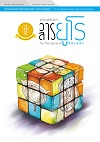The effectiveness of the model of comprehensive discharge planning on adaptational outcomes in Thai radical prostatectomy patients
Keywords:
radical prostatectomy, comprehensive discharge planning, adaptational outcomesAbstract
Objective: To develop and evaluate the Model of Comprehensive Discharge Planning on Adaptational outcomes in Thai radical prostatectomy patients.
Material and Methods: Action research methodology with semistructured interviews, focus group discussions, participant activities and observations. Content analysis was utilized for analyzing qualitative data and compared 4 weeks post-operatively evaluation of patient’s characteristic. Thirty-six consecutive men who underwent radical prostatectomy were evaluated prospectively. The first 18 men were hospitalized under the routine discharge practice in use at our institution and a second group of 18 consecutive men hospitalized under the comprehensive discharge pathway.
Result: The model demonstrated 6 essential elements of the model as follow: 1) Comprehensive discharge pathway 2) Multidisciplinary Team Conference 3) Patient’s Need & Concerns 4) Oncology Nurse Specialist 5) Empowerment program and 6) Post Discharge Support Program. When compare the outcome between 2 group we found that the mean (SD) of Morale adaptational outcomes was 1.4 (0.86) for men in the routine discharge practice and 2.0 (0.84) for men in the comprehensive discharge pathway (P < 0.01). The mean (SD) of hospital stay was 7.1 (0.4) days for men in the routine discharge practice on discharge with catheter and 4.8 (0.3) days for men in the comprehensive discharge pathway on discharge with catheter. (P < 0.01).
Conclusions: Our results demonstrate the success of comprehensive discharge pathway of prostatectomy patient in improving adaptational outcomes and decreased length of stay. Proper patient education and post support program are necessary for a successful outcome.
การศึกษาประสิทธิผลของรูปแบบการวางแผนจำหน่ายผู้ป่วยมะเร็งต่อมลูกหมากแบบครบวงจร ในผู้ป่วยหลังผ่าตัดมะเร็งต่อมลูกหมาก
ผ่องพักตร์ พิทยพันธุ์*, รัชน ศุจิจันทรรัตน์*, ณัฐวรรณ อนุศาสนุนันทน์*, เยาวพร รุ่งเพ็ชรวงศ์*, ดวงพร สันทัด*, นพเก้า ชนะภัย*, พุทธชาติ หล่อฉัตรนพคุณ*, บุญเลี้ยง คำศรี*, อนุพันธ์ ตันติวงศ์**
*ฝ่ายการพยาบาล โรงพยาบาลศิริราช คณะแพทยศาสตร์ ศิริราชพยาบาล มหาวิทยาลัยมหิดล
**สาขาวิชาศัลยศาสตร์ยูโรวิทยา ภาควิชาศัลยศาสตร์ คณะแพทยศาสตร์ ศิริราชพยาบาล มหาวิทยาลัยมหิดล
บทคัดย่อ
วัตถุประสงค์: เพื่อศึกษาประสิทธิผลของรูปแบบการวางแผนจำหน่ายแบบครบวงจรในผู้ป่วยหลังผ่าตัดมะเร็งต่อมลูกหมาก
ผู้ป่วยและวิธีการศึกษา: การวิจัยเชิงปฏิบัติการ รวบรวมข้อมูลโดยสัมภาษณ์เจาะลึก การประชุมสนทนากลุ่ม และการสังเกต วิเคราะห์ข้อมูลเชิงคุณภาพเพื่อพัฒนารูปแบบโดยใช้การวิเคราะห์เชิงเนื้อหาและประเมินผลรูปแบบโดยเปรียบเทียบค่าเฉลี่ยกลุ่มตัวอย่าง
ผลการศึกษา: เมื่อเปรียบเทียบค่าเฉลี่ยกลุ่มตัวอย่าง 36 รายพบว่าผู้ป่วยที่ได้รับการวางแผนจำหน่ายแบบครบวงจรมีค่าเฉลี่ยผลลัพธ์การปรับตัวด้านจิตใจสูงกว่าผู้ป่วยที่ได้รับการวางแผนปกติอย่างมีนัยสำคัญ (p < 0.01) และค่าเฉลี่ยวันนอนของกลุ่มผู้ป่วยที่คาสายสวนปัสสาวะกลับบ้านที่ได้รับการวางแผนจำหน่ายแบบครบวงจร มีค่าเฉลี่ยวันนอนลดลงอย่างมีนัยสำคัญ (p < 0.01)
สรุป: ผลของการวิจัยครั้งนี้แสดงให้เห็นว่า การให้ความรู้และคำปรึกษาตามความต้องการและสิ่งกังวลของผู้ป่วย มีผลต่อการปรับตัวต่อโรคและแผนการรักษา การเสริมสร้างพลังจะช่วยเพิ่มความมั่นใจแก่ผู้ป่วยและญาติในการจัดการอาการกลั้นปัสสาวะไม่อยู่ และการคาสายสวนปัสสาวะกลับบ้าน ส่วนการสนับสนุนหลังจำหน่ายช่วยป้องกันการกลับเข้าโรงพยาบาลอีกครั้งได้



